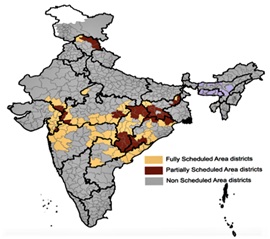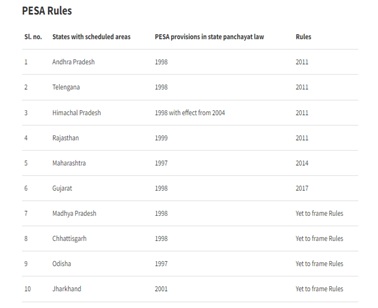

Context
It is the silver jubilee year of the Panchayat (Extension to the Scheduled Areas) Act, 1996. However, the law remains disempowered as 40% of the states under its purview have not been able to frame their rules for its implementation even after 25 years of its existence.
Background
- A quarter-century ago, on December 24, 1996, the Parliament enacted a law unlike any other in the country.
- This was India’s first law to recognize people’s powers, in the form of the gram sabha at the hamlet level.
- This path-breaking legislation was the Provisions of the Panchayat (Extension to the Scheduled Areas) Act of 1996 or PESA.
- The habitations where scheduled tribes (STs) were the preponderant social group were notified as ‘scheduled areas’ by the President of India under Article 244of the Constitution.
Analysis
Panchayat rule in India
- The Constitution (73rd Amendment) Act enacted in 1992 vests power in the Government of the respective State to endow Panchayats with such powers and authority as may be necessary to allow them to function properly as institutions of self-government.
- With the amendment of the Act, Panchayats were given ‘constitutional status’ as an institution of local self-governance for rural India.
- The Act mandates provisions for:
- Establishment of a three-tier structure
- Village Panchayat
- Panchayat Samiti or intermediate level Panchayat
- Zilla Parishad or district level Panchayat
- Establishment of Gram Sabhas (village level).
- Regular elections to Panchayats every five years.
- Proportionate seat reservation for SCs/STs.
- Reservation for women (not less than one-third of seats).
- Constitution of the State Finance Commissions to recommend measures to improve the finances of Panchayats
- However, the areas, predominantly inhabited by the Adivasi population, called scheduled areas, were exempted from these new amendments.
- In 1996, the Panchayat (Extension to the Scheduled Areas) (PESA Act), took local self-governance rules to the areas listed under the fifth schedule.
About PESA Act
- Panchayat (Extension to the Scheduled Areas) (PESA Act) extends the provision of the Indian Constitution to formalize the three-tier Panchayati Raj system to fifth Schedule areas with certain modifications and exceptions.
- Promotion of self-government: It mandates the state to devolve certain political, administrative, and fiscal powers to local governments elected by the communities.
- All tribals inclusive: PESA was meant to benefit not only the majority of tribals but also extended to cover minority non-tribal communities.
- Effective reservation: It guarantees tribes half of the seats in the elected local governments and the seat of the chairperson at all hierarchical levels of the Panchayat system.
|
Sixth Schedule of the Constitution
Fifth Schedule of the Constitution
|
What are Scheduled areas?
- Under Article 244 of the Constitution, the President of India notifies the habitations where scheduled tribes (STs) were the preponderant social group as ‘scheduled areas’.
- Scheduled areas have been notified in Andhra Pradesh, Chhattisgarh, Gujarat, Himachal Pradesh, Jharkhand, Odisha, Madhya Pradesh, Maharashtra, Rajasthan, and Telangana.
- In the country, STs are not notified in Punjab and Haryana and the UTs of Chandigarh, Delhi, and Puducherry.
|
Scheduled Tribes
Issues faced by STs
|
Are STs placed rightly?
- Thousands of habitations in the states where STs are the major social group have been left out.
- Of the 640 administrative districts, 104 have scheduled areas, 36 are fully notified and 68 are partially notified.
- Some 11.3 % of the total geographical area of the country is notified scheduled area.
- And about 5.7 % of India’s population – both tribal peoples and otherwise – resides here; but only about 35.2% of STs reside in scheduled areas.
- The majority of India’s STs continue to be denied their special constitutional protections.
- About 53% of the population in scheduled areas are STs – despite the massive influx of outsiders, ‘development’ projects, and the resulting displacement.
- The process for scheduled area notifications has not been carried out in 11 of the 12 remaining states eligible under the Fifth Schedule of Article 244.

What is the actual situation?
- Only six of the 10 relevant states have rules to operationalize PESA provisions: Andhra, Telangana, Himachal Pradesh, Rajasthan, Maharashtra, and Gujarat.
- So PESA is effectively nonexistent in these 10 states.

The persistent denials
- Denial of self-government: Tribal communities have progressively been denied self-government.
- Denial of rights: They have been also denied their rights to their communities’ natural resources (land, mines and minerals, minor forest produce etc.,) that should have been provided under the legislation.
|
Case Study
The case is considered a milestone that shows the power of the gram sabhas but this one of the rare achievements of PESA even as underlines the possibilities the Act carries. But experts argue that law, however, has failed to achieve its potential and has not created any significant impact on the ground. |
What led to its failure?
- Ineffective follow up: Though the Act was enacted but concerned government never pushed to formulate necessary rules. As a result, it was not taken seriously
- There is another reason which made the act irrelevant. After enacting PESA, the Union government brought several other legislations and included many provisions of PESA into these laws. For instance,
- the Land Acquisition Act, 2013 empowered gram sabhas immensely
- the Forest Right Act, 2006 has provisions of PESA
Now when people need to protect their rights and resources, they look up to these laws.
- Time period not specified for rules: In addition to the above, PESA does not specify rule-making powers or provide a time period by which the States have to frame rules.
Conclusion
In its 25th year when several laws related to mining have been proposed, PESA faces a unique question about its relevance.
Simply put, the issue that that the states have not framed appropriate rules under PESA, and therefore the official system has not operationalized PESA. Therefore, the need of the hour is to strengthen the system for effective implementation of the law.


